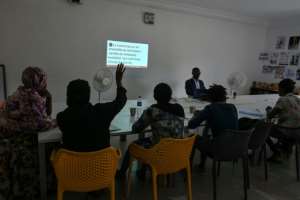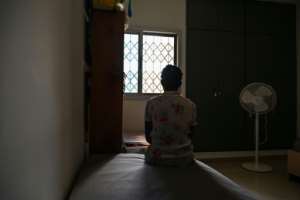Emmanuelle, 24, arrived at the centre two months ago after she discovered that her partner’s 16-year-old son had sexually assaulted her daughters in their shared home.
The teenager raped her one-year-old daughter while Emanuelle was out working.
 Various specialists work at the NGO to help provide support to the women. By Issouf SANOGO (AFP)
Various specialists work at the NGO to help provide support to the women. By Issouf SANOGO (AFP)
“When I came here, I was hearing voices. I wanted to take my own life,” she told AFP.
“This helped me. It brought me back to my senses… Without this help, I thought I was going to go crazy.”
Like the other victim quoted in this story, her name has been changed to protect her identity.
Social reintegration
Prince Tra Bi, a psychologist working at the centre, said post-traumatic stress disorder and depression were “recurrent” problems among the women he sees there.
“The only solution for me was death. Now I want to live,” Emanuelle said. “I have hope for life — I think that (the therapy) has worked.”
Weeks after arriving, Emmanuelle said she has started to recover her self-esteem. She now wants to be “an independent woman, a free woman”. She has been surrounded by others who are “like sisters.”
Maureen Grisot, co-founder and executive director of the centre, told AFP that in Ivory Coast, only “30 per cent of women who are victims of violence… ask for help, and it’s generally from their families.”
Women usually discover the centre through word-of-mouth or social media, she said.
Upon arrival, women have an initial talk with staff, without having to show their papers.
 Only 30 per cent of women who are victims of violence in the Ivory Coast seek support. By Issouf SANOGO (AFP)
Only 30 per cent of women who are victims of violence in the Ivory Coast seek support. By Issouf SANOGO (AFP)
Staff then draw up an action plan. The women can talk to and be monitored by various professionals, all at the centre’s premises.
Social workers, a midwife, a legal expert, a psychologist, a doctor and a lawyer are present or available on call.
When a woman is no longer in danger, the NGO plans out further steps towards social and professional reintegration.
Gaining self-esteem
Laurentine Aguie-Koffi is one of the legal experts at Akwaba Mousso. She helps women with their legal proceedings and makes them aware of their rights.
The Ivory Coast has laws to protect victims of violence, but “doesn’t promote them”, she said.
In December 2021, the country adopted a new law to reinforce the protection of women victims.
“This law is really important because it serves to rescue a person urgently from violence,” Aguie-Koffi said.
However, a report published in 2022 found that protection mechanisms were still failing due to “a cruel lack of resources and equipment in the medical, social and legal services.”
All of Akwaba Mousso’s services are provided free, thanks to private donations and local district funding.
However, the NGO still seeks further funding.
Huguette, another woman supported by the centre, told AFP that in her home her husband was a “dictator” who treated her like she was “nothing”.
“When I came here I didn’t think I was worth anything… I was depressed,” she said.
“Now, with self-esteem, I feel… like a person,” she added. “No one imposes anything on me.”
